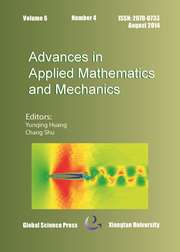No CrossRef data available.
Article contents
Error Estimates and Superconvergence of Mixed Finite Element Methods for Optimal Control Problems with Low Regularity
Published online by Cambridge University Press: 03 June 2015
Abstract
In this paper, we investigate the error estimates and superconvergence property of mixed finite element methods for elliptic optimal control problems. The state and co-state are approximated by the lowest order Raviart-Thomas mixed finite element spaces and the control variable is approximated by piecewise constant functions. We derive L2 and L∞-error estimates for the control variable. Moreover, using a recovery operator, we also derive some superconvergence results for the control variable. Finally, a numerical example is given to demonstrate the theoretical results.
Keywords
- Type
- Research Article
- Information
- Copyright
- Copyright © Global-Science Press 2012


